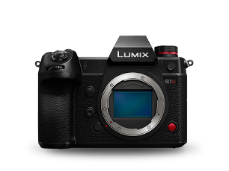
UK-based filmmaker and Emmy Award winner Peter Hamblin is working on his movie In Hope of Nothing, which he is shooting exclusively on the LUMIX S1H. This film is inspired by the struggle independent filmmakers face when trying to get their ideas on the big screen. As Peter explains, ‘At the core of independent film is the hustle, actually getting the film made, which is both exhausting and satisfying at the same time. This is what inspired our film In Hope Of Nothing.
Peter Hamblin is fascinated by the idea of creating something out of nothing. 'Taking a thought or a feeling and bringing it to life in a way that entertains and surprises people is something I’ve always enjoyed. I’ve always loved the medium of film and its subjective nature. This ability to stir emotions and entertain, to keep people on the edge of their seats, guessing where the story is going, is magical. Film allows for endless possibilities and provides the opportunity to push the boundaries of storytelling. Pushing those boundaries and taking risks is also at the heart of In Hope of Nothing. It’s a film about two brothers who tried to make a film three years ago but had their budget pulled by the studio because they couldn’t agree on the characterisation of their leading role, Leonard. They are given a second chance, as long as they can agree on who Leonard is. This sets the brothers off on a journey of discovery.’
What did you like most about the LUMIX S1H camera? 'What’s not to like. For me the key features are anamorphic, lowlight and dynamic range. Shooting anamorphic for me on a small camera is great, as it allows me to capture the vintage aesthetic I’m after while swinging it around on a Steadicam for long single shots. We have a great deal of low light, moody, high-contrast scenes. The camera produces almost no noise, even at high ISO settings. Having more than 14 stops in the dynamic range is brilliant and there is so much info in the files when you begin grading the video. This camera really compliments our creative process and delivers stunning results, and it will give a lot of the more expensive cinema cameras a run for their money, especially given its price point. Filmmakers who can’t afford these expensive cameras can achieve the same quality and range with the S1H.’
How was this film made? ‘In filmmaking teamwork is everything: without my producer Frankie Fogg, my DP Sam Dewar, and the legend that is Zack Melluish I/we wouldn’t be able to do what we do. DP Sam Dewar explains some of the technical aspects: ‘We were shooting anamorphic so we used the camera in 4:3 mode, with a resolution of 3328x2496. We predominantly shot at 24fps (4:2:2, 10bit, All-I codec), but some scenes were shot at 48fps. Being able to shoot anamorphic on this camera was a game-changer, and to my knowledge there aren't any other cameras of this size that can do that.
The field of Independent Film is a playground, there aren’t any rules and you can explore and create anything you want. The creative process is always the same (follow what you feel, your gut instincts). At the end of the day you need to love what you make, as it is a highly subjective medium and there will always be haters. It’s important for me to push my own boundaries, to not repeat, and to find joy in the process. This is also my message in this film: get out there and make it, even if you don’t have a budget, as it will be the first step in a journey of learning and growing.’

Peter Hamblin
South African born, Durban raised Peter has travelled and lived in many places across the globe including LA, London and Cape Town. He began his career in the world of advertising and commercials but instantaneously realised he wanted to be creating long form series and feature films. At this point he started a production company, Hamblin Imagery, in 2009. His career highlights to date include writing, producing and directing short film ‘Wright side of Wrong’ which won awards for ‘best short’ and ‘best edit’ at the X Dance Action Sports Film Festival in the US. His latest achievement has been writing, directing and producing ‘Let’s Be Frank’ a fiction/non-fiction exploration into the world of a big wave surfer. Bringing a fresh new style to the world of surf films and a study into the art of film-making. This went on to win multiple best film accolades worldwide, including an Emmy award.










